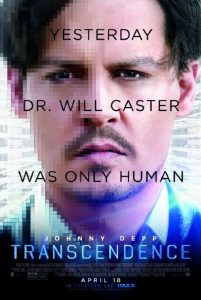
 What could have been layered and thought-provoking turns out to be bland and sanctimonious, “Transcendence” is anything but transcendent.
What could have been layered and thought-provoking turns out to be bland and sanctimonious, “Transcendence” is anything but transcendent.
Clearly meant as an introduction to award-winning cinematographer turned director Wally Pfister, “Transcendence” is a very good-looking failure. The film possesses a lot of the same handsome camera work that seamlessly melded with special-effects in Christopher Nolan’s “Inception” for which Pfister won the Oscar. Unfortunately, it is the story and in particular the film’s closing act that just lets the entire production down. The “Transcendence” script, meant as a cautionary tale about the dangers of dependence on technology and in particular the Internet, was penned by first-time screenwriter Jack Paglen.
As a lifelong science-fiction fan, one wonders why Pfister decided to put his hopes for his first feature on an original screenplay not based on a novel with a weightier examination of the subject. Perhaps Paglen’s script possessed a bit more wit, intellect, and verve but what audiences get on screen is almost wholly lacking. After a brief introduction to a world in which gifted computer scientist Will Caster (Johnny Depp) is attacked along with other computer scientists by a terrorist group hell-bent on taking everyone off the grid, the story devolves into a broad and frustrating series of illogical and plot driven occurrences. The concept here is that one’s mind can be loaded into a computer and then do unbelievable things. And unbelievable is right. In “Transcendence,” Depp goes from being uploaded to a powerful computer, to making huge amounts of money on the stock market, and then using nanotechnology to create and repair people. Although the events take place over a number of years, we do not get the impression that a great amount of time has actually passed. Everything is compressed and seems to occur immediately. It is all just a little too much.
But what most frustrated me was the film’s central theme, that of creating a deity inside of a computer, is mishandled to an almost laughable degree. When Caster reveals himself as an all-powerful computerized entity, the government chooses not to have a dialogue but to seek ways of destroy him. What frustrated me is that Caster offers the cure to not only cancer but to most everything and when presented with this evidence and an opportunity to form a dialogue, the “heroes” of the film choose to spit in the deities eye. I was reminded of Noah, whether adapted by Darren Aronofsky or directly from the biblical source.
The reason why the story must end with violence instead of wit and stimulating conversation is probably related directly to the need for Pfister to deliver for producers. This is, after all, an early summer blockbuster release at the metroplex. And, like we saw with the Captain America sequel, things must end with explosions and gunfire, no matter how provocative this set up. I suppose from gifted cinematographer Pfister directing his first feature, I expected more.
As I said though the film looks great. And there is a segment of viewers that might be mesmerized by the visuals. However, if you’re a science-fiction fan, you would probably do better taking in Jonathan Glazer’s difficult to recommend but no doubt brilliant “Under the Skin.” Transcendence is a missed opportunity.
Note: One thought I had after watching the film was how much I appreciated David Cronenberg’s 1986 remake of “The Fly.” It also dealt with a transformation of a gifted scientist into something else. And like “Transcendence,” there was a bit of a romantic tragedy at its core. But given the business of blockbuster cinema these days, it is doubtful that something approximating Cronenberg could be made with the “Transcendence” budget and released on a “Transcendence” scale without a “Transcendence” storyline that contains rather non transcendent material. More’s the pity…
